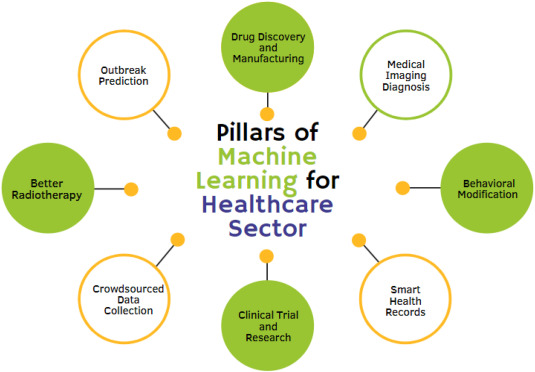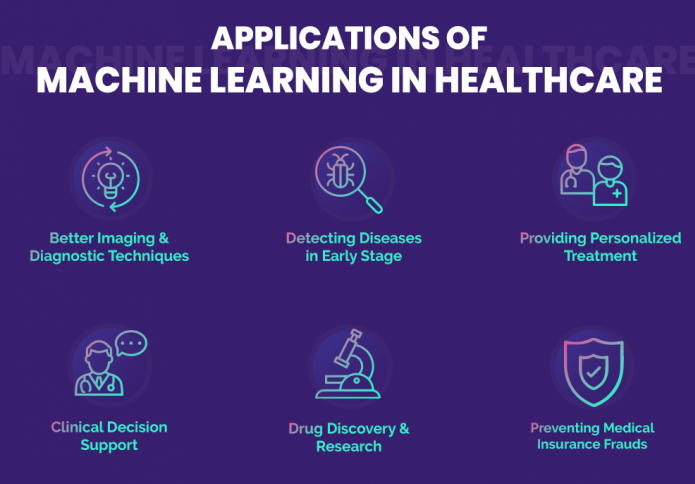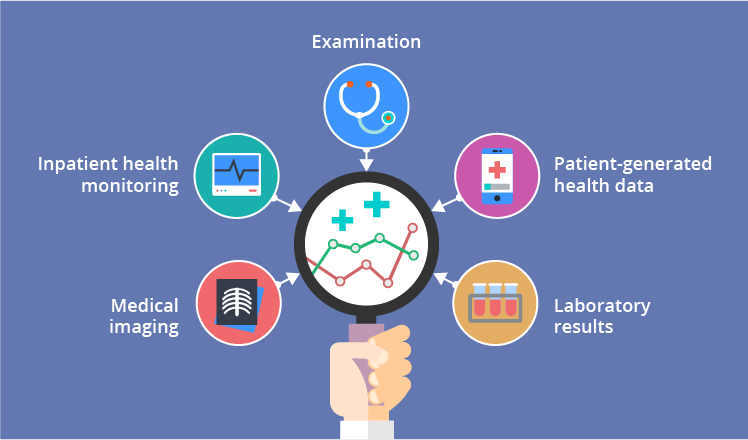Table of Contents
Machine learning in healthcare is revolutionizing the healthcare industry by leveraging data-driven algorithms to analyze vast amounts of medical information and improve patient outcomes. By identifying patterns and trends that humans might miss, ML applications are enhancing diagnosis, treatment, and overall healthcare delivery.
What is Machine learning?
Machine Learning is a subset of artificial intelligence that allows computers to learn from data and improve their performance on a specific task without being explicitly programmed. Instead of being given specific instructions, ML algorithms can identify patterns and make predictions based on the data they are trained on.
Key Components of Machine Learning

- Data: The foundation of ML is data. High-quality, relevant data is crucial for training effective models.
- Algorithm: The algorithm is the set of instructions that the computer follows to learn from the data. Common algorithms include:
- Supervised Learning: The algorithm is trained on labelled data, where the correct output is provided for each input.
- Unsupervised Learning: The algorithm is trained on unlabeled data, and it must discover patterns or structures within the data.
- Reinforcement Learning: The algorithm learns through trial and error, receiving rewards or penalties based on its actions.
- Model: The model is the output of the learning process. It represents the learned patterns and can be used to make predictions on new data.
Is machine learning a fast-growing trend in the health care industry?
Yes, machine learning in healthcare is a rapidly growing trend in the healthcare industry. The ability of ML algorithms to analyze vast amounts of medical data and identify patterns has significant implications. Machine learning is rapidly transforming the healthcare landscape. By analyzing vast amounts of medical data, ML algorithms are improving diagnosis, personalizing treatments, accelerating drug discovery, and optimizing healthcare administration. As the volume of medical data continues to grow and ML technology advances, we can expect to see even more innovative applications in the future.
The Real-world benefits of machine learning in healthcare
- Diagnosis is revolutionizing the healthcare industry by leveraging powerful algorithms to analyze medical images and data. By identifying patterns and anomalies that may be imperceptible to the human eye, ML models can assist in detecting diseases like cancer, cardiovascular abnormalities, and neurological disorders with greater accuracy and speed. This technology is empowering healthcare professionals to make more informed decisions and improve patient outcomes.
- personalized medicine leverages data-driven algorithms to tailor treatment plans to individual patients. By analyzing a patient’s genetic makeup, medical history, and other relevant factors, ML can identify the most effective therapies and minimize side effects. This approach has the potential to revolutionize healthcare by providing more precise and efficient care.
- Drug discovery by accelerating the process of identifying and developing new medications. ML algorithms can analyze vast datasets of molecular structures, biological properties, and clinical trial results to predict potential drug candidates, identify promising targets, and optimize drug design. This enables researchers to explore a wider range of possibilities more efficiently, reducing the time and cost associated with traditional drug discovery methods.
- Healthcare administration is revolutionizing the way healthcare organizations operate. By analyzing vast amounts of data, ML algorithms can optimize tasks like scheduling, resource allocation, and fraud detection. This leads to improved efficiency, reduced costs, and better patient outcomes. For example, ML can predict patient readmissions, allowing hospitals to implement preventive measures and reduce unnecessary costs.
- patient monitoring is revolutionizing healthcare by enabling continuous and remote tracking of patient health. By analyzing data from wearable devices, medical sensors, and electronic health records, ML algorithms can detect early signs of disease, predict adverse events, and provide personalized care. This technology is particularly valuable for patients with chronic conditions, as it allows for proactive interventions and improved outcomes.
Potential Impact of Machine Learning in Healthcare

Machine learning in healthcare has the potential to revolutionize healthcare industry by providing significant benefits in various areas:
Improved Diagnosis and Treatment
- Enhanced accuracy: ML algorithms can analyse medical images (X-rays, MRIs, CT scans) with greater accuracy than human experts, leading to earlier detection of diseases and more effective treatments.
- Personalized medicine: ML can tailor treatment plans to individual patients based on their genetic makeup, medical history, and other factors, improving outcomes and reducing side effects.
Accelerated Drug Discovery
- Efficient screening: ML can rapidly screen vast databases of compounds to identify potential drug candidates.
- Predictive modelling: ML can predict the properties of new molecules, helping researchers design more effective drugs.
Optimized Healthcare Administration
- Predictive analytics: ML can forecast disease outbreaks, patient readmissions, and resource needs, allowing for proactive interventions and better planning.
- Fraud detection: ML can identify patterns of fraudulent activity in healthcare claims, helping to reduce costs and improve efficiency.
Reduced Healthcare Costs
- Efficient resource allocation: ML can optimize the allocation of resources, such as beds and staff, based on patient demand and needs.
- Reduced waste: ML can help identify and eliminate waste in healthcare operations, such as unnecessary tests or procedures.
Improved Patient Outcomes
- Early detection: ML can enable earlier detection of diseases, leading to better treatment outcomes.
- Enhanced patient experience: ML can improve the patient experience by providing personalized care and reducing wait times.
Overall, machine learning in healthcare has the potential to transform healthcare by improving diagnosis, treatment, drug discovery, administration, and patient outcomes. As machine learning in healthcare continues to advance, we can expect to see even more innovative and impactful applications.
Drawbacks of Machine Learning in Healthcare

While machine learning has the potential to revolutionize healthcare, there are also some drawbacks to consider:
- Data Quality and Bias: ML models rely on high-quality data to function effectively. If the data is biased or incomplete, the models may produce inaccurate results.
- Explain ability: Some ML algorithms, such as deep learning, can be difficult to interpret, making it challenging to understand how they arrived at a particular decision. This can be problematic in healthcare, where transparency and accountability are crucial.
- Ethical Concerns: The use of ML in healthcare raises ethical concerns, such as privacy, bias, and the potential for job displacement.
- Cost: Implementing ML solutions can be expensive, particularly for smaller healthcare organizations.
- Regulatory Challenges: The integration of ML into healthcare systems may face regulatory hurdles, as new technologies often require careful evaluation and approval.
Despite these drawbacks, the potential benefits of machine learning in healthcare are significant. By addressing these challenges and continuing to develop and refine ML technologies, we can harness the full potential of this powerful tool to improve patient outcomes and transform the healthcare industry.
conclusion
Machine learning in healthcare has the potential to revolutionize healthcare by improving diagnosis, treatment, drug discovery, administration, and patient outcomes. However, it is essential to address the challenges and ethical considerations associated with its implementation. By carefully considering these factors and continuing to develop and refine ML technologies, we can harness the full potential of this powerful tool to transform the healthcare industry.